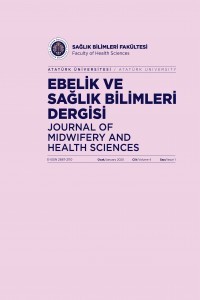EBELİK BÖLÜMÜ SON SINIF ÖĞRENCİLERİNİN MESLEKİ AİDİYET DÜZEYLERİ VE ETKİLEYEN FAKTÖRLER: KESİTSEL BİR ÇALIŞMA
Ebelik, Aidiyet, Ebelik Öğrencisi, Mesleki Aidiyet
PROFESSIONAL BELONGING LEVELS OF MIDWIFERY DEPARTMENT FINAL-YEAR STUDENTS AND AFFECTING FACTORS: A CROSS-SECTIONAL STUDY
Belonging, midwifery, midwifery student, professional belonging,
___
- Akça E ve ark. Ebelik Öğrencilerinin Sosyal Zeka Düzeyleri ile Meslek Algıları Arasındaki İlişki. Cukurova Medical Journal, 2019;44(2):621-31.
- Arslan H ve ark. Ebeliğin Doğası ve Doğum Şekli Üzerine Etkisi. Maltepe Üniversitesi Hemşirelik Bilim ve Sanatı Dergisi, 2008;1(2):54-9.
- Ashktorab T et al. Factors Affecting the Belongingness Sense of Undergraduate Nursing Students Towards Clinical Setting: A qualitative Study. Journal of Caring Sciences, 2017;6(3):221.
- Ay F ve ark. Ebelik Öğrencilerinin Meslek Algıları ve Kariyer Planlarını Etkileyen Faktörler. Balıkesir Sağlık Bilimleri Dergisi, 2018; 7(2):74-82.
- Baskaya Y et al. How Much Do I Belong To My Profession? A Scale Development Study: Midwifery Belonging Scale. Health Care for Women International. 2020:41(8):883-98
- Başkaya Y. Türkiye'deki Ebelerin Mesleki Aidiyeti ve Tükenmişlik Düzeyleriyle İlişkisi Eskişehir Osmangazi Üniversitesi, 2018 (Yayınlanmış Doktora Tezi).
- Cullen D et al. Young Student's Motivations to Choose An Undergraduate Midwifery Program. Women and Birth, 2016;29(3):234-9.
- Dabirifard M et al. Evaluation Level of Clinical Belongingness in Bachelor Nursing Students. Education Strategies in Medical Sciences. 2016;9(1):90-6.
- Duru E. Genel Aidiyet Ölçeğinin Psikometrik Özellikleri: Geçerlik ve Güvenirlik Çalışması. Türk Psikolojik Danışma ve Rehberlik Dergisi, 2015;5(44):37-47.
- Evans J et al. The Future in Their Hands: Graduating Student Midwives’ Plans, Job Satisfaction and the Desire to Work in Midwifery Continuity of Care. Women and Birth, 2020;33(1):e59-e66.
- Gaskin IM. İna May’in Doğum Meselesi, Bir Ebenin Manifestosu [Birth Matters—A Midwife’s Manifesta](Fatma Deniz Sayıner, ed.). Ankara: Akademisyen Kitabevi. 2018.
- Hill, D. L. Sense of Belonging as Connectedness, American Indian Worldview, and Mental Health. Arc. Pscyhiatric Nursing, 2006;20(5): 210-6.
- İlhan S. Yeni Kapitalizm ve Meslek Olgusunun Değişen Anlamları Üzerine. Dumlupınar Üniversitesi Sosyal Bilimler Dergisi, 2015:(21):314-28
- Keskin R, Pakdemirli MN. Mesleki Aidiyet Ölçeği: Bir Ölçek Geliştirme, Geçerlilik ve Güvenirlik Çalışması. Journal of International Social Research, 2016;9(43):2580-7
- Lee RM, Robbins SB. The Relationship Between Social Connectedness and Anxiety, Self-Esteem, and Social Identity. Journal of Counselling Psychology, 1998; 45(3): 338-45.
- Levett-Jones T, Lathlean J. Belongingness: A Prerequisite for Nursing Students’ Clinical Learning. Nurse Education İn Practice, 2008;8(2):103-11.
- Liljedahl M et al. To Belong or Not to Belong: Nursing Students’ Interactions with Clinical Learning Environments–An Observational Study. BMC medical education, 2016;16(1):197.
- McKenna L et al. Undergraduate Midwifery Students' Sense of Belongingness in Clinical Practice. Nurse Education Today, 2013;33(8):880-3.
- Özdevecioğlu M, Aktaş Aga. Kariyer Bağlılığı, Mesleki Bağlılık ve Örgütsel Bağlılığın Yaşam Tatmini Üzerindeki Etkisi: İş-Aile Çatışmasının Rolü. Erciyes Üniversitesi İktisadi ve İdari Bilimler Fakültesi Dergisi, 2007;(28):1-20
- Peter MZ et al. Belonging: Concept, Meaning, and Commitment. US-China Education Review. 2015;5(2):95-101.
- Radford DR, Hellyer P. Belongingness in Undergraduate Dental Education. British Dental Journal, 2016;220(10):539-43.
- Saadatbakht M et al. The Effectiveness of Group Counseling with Emphasis on Communication Skills on Midwifery Students’ Sense of Belonging in Clinical Settings. Strides in Development of Medical Education. 2019;16(1):2-7
- Skinner E et al. Engagement and Disaffection in The Classroom: Part of a Larger Motivational Dynamic? Journal of educational psychology, 2008;100(4):765.
- St-Amand J et al. Sense of Belonging at School: Defining Attributes, Determinants, and Sustaining Strategies. iafor Journal of Education, 2017;5(2):105-19.
- Tella A et al. Work Motivation, Job Satisfaction, and Organisational Commitment of Library Personnel in Academic and Research Libraries in Oyo State, Nigeria. Library philosophy and practice, 2007;9(2):13.
- Toker E ve ark. Bir Hastanede çalışan ebelerin mesleki örgütlenme durumu, i̇ş doyumu ve tükenmişlik düzeylerinin belirlenmesi. Sağlık ve Toplum. 2020;20(1):88-97.
- Vivekananda-Schmidt P, Sandars J. Belongingness and its implications for Undergraduate Health Professions Education: a Scoping Review. Education for Primary Care, 2018;29(5):268-75.
- Yılmaz T ve ark. Hemşirelerin ve Ebelerin Mesleklerini Algılama Biçimleri ve Gelecekten Beklentileri. Sağlık ve Hemşirelik Yönetimi Dergisi, 2014;1(3):130-9.
- Yücel U ve ark. Ebelik Öğrencilerinin Meslek ile İlgili Görüşlerinin ve Mezuniyet Sonrası Çalışmak İstedikleri Kurumların Değerlendirilmesi. Gümüşhane Üniversitesi Sağlık Bilimleri Dergisi, 2017;6(4):69-76.
- Yayın Aralığı: Yılda 3 Sayı
- Başlangıç: 2018
- Yayıncı: Atatürk Üniversitesi Sağlık Bilimleri Fakültesi
COVİD-19 PANDEMİSİNDE YENİDOĞAN VE EBELİK YAKLAŞIMI
PRE-PERİNATAL DÖNEMDE UYGULANAN ‘GEBE MASAJI’NA BİR BAKIŞ
Yeliz ÇAKIR KOÇAK, Ümran SEVİL
ANNELERİN ÖZ YETERLİKLERİ VE DOĞUM SONU GÜVENLİK HİSLERİNİN DEĞERLENDİRİLMESİ
Vesile KOÇAK, Kamile ALTUNTUĞ, Emel EGE
DOĞUM ŞEKLİNİN KADIN CİNSEL İŞLEVİ ÜZERİNE ETKİSİNİN İNCELENMESİ
DOĞUM SONRASI BAKIM VE EV ZİYARETLERİNİN ÖNEMİ
Sibel OCAK AKTÜRK, Tuba KIZILKAYA, Melike ÇELİK, Tülay YILMAZ
Düzeltme: PRİMİPAR VE MULTİPAR GEBELERDE ALGILANAN STRES VE ETKİLEYEN FAKTÖRLERİN İNCELENMESİ
Dilek KALOĞLU BİNİCİ, Sevinç KÖSE TUNCER
GEBELERDE EMZİRME ÖZ-YETERLİLİĞİ VE ETKİLEYEN FAKTÖRLERİN BELİRLENMESİ
Tuğba KONUKOĞLU, Türkan PASİNLİOĞLU
EBELERİN KÜLTÜRLERARASI DUYARLILIKLARININ VİCDAN ALGILARINA ETKİSİ
